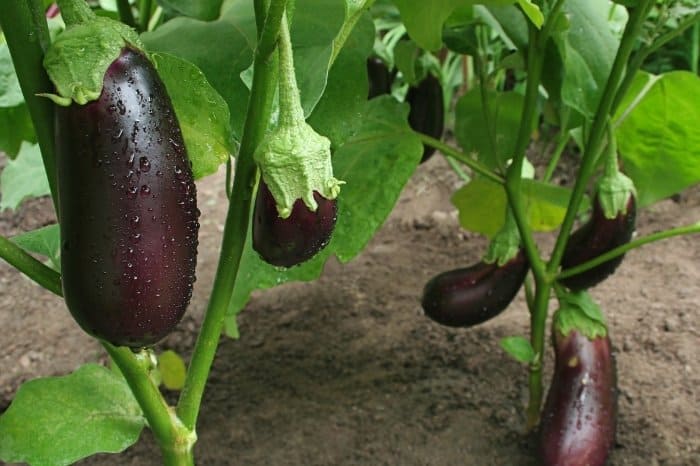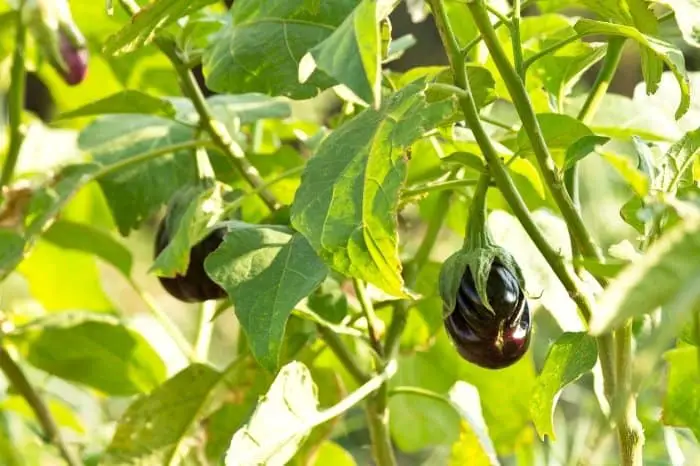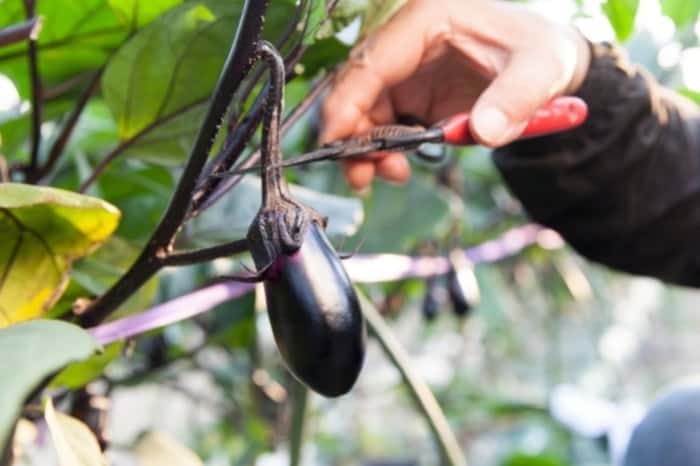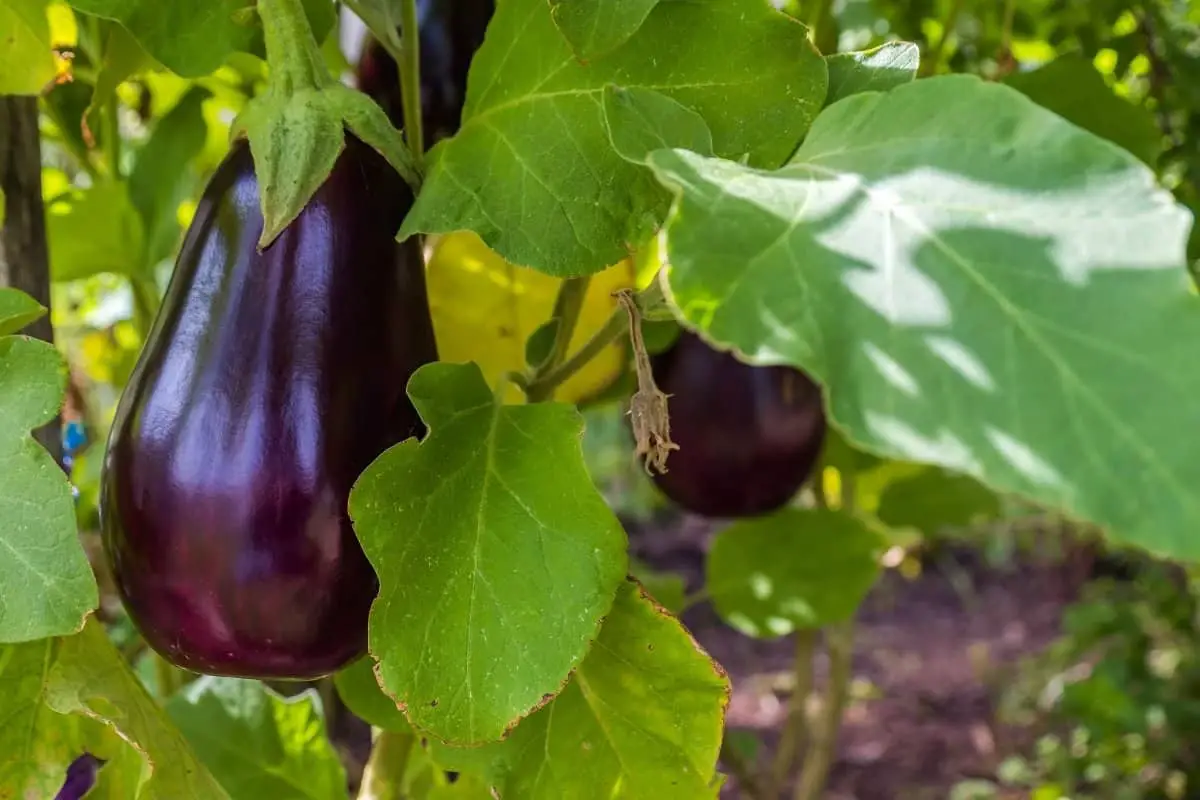Last Updated on August 19, 2023 by Griselda M.
Whether you call it brinjal, aubergine, or eggplant, this plant is interesting to grow and yummy to eat, but how long do eggplant plants live?
Eggplant is one of the many vegetable plants you can grow in large containers or the garden. It would be best to have enough space and the right growing conditions for this vegetable to thrive.
The eggplant plants live and love warm weather conditions. It is best used in cooking recipes and loved for its unique taste.
The purple, pear-shaped fruit is native to Asia, where it grows as a wild perennial plant. Its edible fruit has been used for thousands of years and has a history of medicinal use.
The vegetative parts and roots from wild eggplant species have been documented as a sedative that treats skin issues like sores and rashes.
How Long Do Eggplant Plants Live?
How long to grow eggplants depends on the variety you are growing after planting your eggplants.
Harvest your eggplants from 65 to 80 days after transplanting and 100 to 120 days after starting from seed. But don’t forget all this depends on the variety.
Depending on your growing zone and the variety you are growing, July, August, September, and even October are harvest months for eggplant. Bottomline this plant is an annual that grows only once and must be planted afresh again in the next season.

Planting Eggplant From Seed
Eggplants take a relatively long time from planting to maturity. They also do not thrive in cool weather.
If you plan to grow eggplants from seed, you will need to start them indoors at least 8 to 10 weeks before your region’s average last frost date.
Seeds and seedlings require warm soil to germinate and grow quickly. The best soil temperature for germination should be between 70 and 90 degrees F.
Ensure you plant your seedlings in the warmest location in your home or use a heating mat to warm your soil.
Growing Eggplant Plants As Transplants
If you plant eggplants from transplants, ensure you do so after the danger of frost has passed and the soil is warm enough. The daytime temperatures should be at least 70 to 85 degrees F. Any light frost can severely damage the transplants, so be sure that the frost days are over.
Cool temperatures slow down growth significantly, so to overcome this, keep your transplants indoors until the weather warms up. Remember to use big containers when the plants are indoors to avoid overgrowing the small pots or planting them outdoors too soon.
If you are purchasing transplants from a garden centre, do not buy them until the final frost date has passed. Choose plants with dense and compact growth, avoiding those that already have blossomed.
Blossoms already on seedlings may slow the growth after transplanting and lead to fewer or smaller eggplants at harvest.
Common Cultivars To Select
Eggplants have different cultivars to choose from when you want to grow your own. The common varying shades of purple, white, green and yellow, green come in a multitude of shapes and sizes enjoyed worldwide. Let’s look at the most common ones.
- Millionaire Purple. This variety is long and skinny, bearing slender 8-inch fruits with light to dark purple skin. The flesh is seedless and can grow from seed to maturity in 55 days. It is one of the fastest-growing varieties.
- Black Beauty. This is the commonly known variety that has been grown for over a century. It bears 6-inch dark purple fruits making it favourable to most gardeners. It has an attractive yield of 4 to 6 fruits per plant.
- Gretel. This variety is a 2005 all American winner that produces white fruits. The fruits of this variety are 3 to 4 inches long with few seeds and no bitter taste. The fruits are sweet and tender skinned. This variety is best for container gardening as they grow only to 2 ½ feet tall and wide.
Sow Right Seeds – Eggplant Seed Collection for Planting – Black Beauty and Long Eggplant Varieties
Different Cultivars And Their Maturity Time
Different eggplant cultivars show considerable variation in the time they take to reach maturity. Use this article to guide you if you want to know how long it will take you to harvest your eggplants.
The time to maturity is measured from when eggplant is transplanted into the garden until its fruits become ripe. Some manufacturers list the time it takes on the calculated from when the seeds are planted.
- Millionaire, Easter egg – They mature in 50 to 55 days
- Tango, Calliope, Dusky, and Epic – These take 60 to 64 days to mature.
- Black bell, Casper, black magic, Ichiban, Fairy tale, Nadia, Little fingers, Slim Jim, Orient Charm, and Snowy – Take 65 to 72 days to mature.
- Black beauty, Classic, Burpee Hybrid, Santana, Ghostbuster, and Rosa Bianca – These take 73 to 80 days to mature.
Growing Conditions For Eggplant Plants
Eggplants adapt well to a range of growing conditions as long as the soil is warm. Providing them with the best-growing conditions improves the plant’s growth and yields. Let’s look at these optimal conditions.
- Soil. The soil must be well-draining and relatively high in organic matter.
- Sunlight. Eggplants thrive under full sun producing a good supply of fruits.

- Water. Eggplants require at least an inch of water per week especially when they produce fruits. Once established after planting, they can tolerate dry conditions.
- Fertilizer. When planting, apply 1 ¼ pound of 5-10-10 fertilizer per 10 feet of row. Ensure you work the fertilizer into the surface of the soil before planting your eggplants.
You can side-dress your plants when the fruits are the size of a quarter. Use at least 3 ounces of calcium nitrate fertilizer per 10 feet of row.
Harvesting Your Eggplant
Having seen that the timing of your harvest depends on the particular variety of the eggplant you are growing, let’s learn about harvesting.
Eggplants fruits taste the best when harvested before they reach full maturity. When they are ready for harvest, the skin will have a glossy look, the flesh will be cream coloured, and the seeds will not be fully developed or very small.
If you harvest the eggplants when they are about half the expected mature size, it encourages them to produce more fruit. If you wait too long to harvest, the skin may become dull and tough, and there may be abundant seeds.
The eggplant plants live through one season. After harvesting the final fruits, the plant dies, and it’s time to plant new one’s next season.

Take-Home
Growing eggplants is worth the time and effort you put in towards good produce. Although time-consuming, it is well worth the effort, and no gardener can try it.
Have you grown these vegetables before? Could you share with us your secret to success?
FAQs
Do eggplants grow back every year?
Eggplants are annual plants that can be grown in any well-drained soil, in sun or partial shade. They prefer a moist environment and require ample amounts of water. They are easy to grow and are extremely versatile. They are used as an ornamental plant for its decorative foliage, the size and color of the fruit, and the fact that they are edible. You can use them in salads, as a vegetable, or as a garnish.
Do eggplants produce more than once?
The number of eggplants you can get from a single plant depends on how fertile the soil is and the size of the eggplant. Eggplants produce up to 6 large fruit per plant, with many seeds. They also have a tendency to spread, so the plants will be larger.
A plant that is producing eggplants will continue to do so for many years. Eggplants are self-pollinating plants, which means that the pollen they produce is usually enough to fertilize them.
How tall do eggplants get?
In the United States, most eggplant are grown to about 2-3 feet tall, although the variety ‘Big Jim’ can grow as tall as 6-8 feet. The plant is vigorous, with large leaves and many side branches. The fruit can weigh up to 10 pounds and is dark purple in color. Eggplant is a cool weather crop and should be planted in mid- to late spring in fertile soil. Eggplants are ready for harvest when the skin is tight and firm. Leave them on the plants until they start to shrivel, then cut off the top of the stem and remove the fruits.
How much water do eggplants need?
If you are growing eggplant for the first time, you might be wondering how much water your plants need. There is no fixed rule for how much water eggplants require.
It all depends on the size of your plant, the weather conditions and the variety of eggplant you choose. Smaller, younger plants will need a larger amount of water than older, more mature ones. In general, one to two gallons of water per week is sufficient for the average, mature eggplant.
Do eggplants need a lot of sun?
In general, eggplant plants like to be grown in full sun. However, you can plant your eggplants under a light shade. In this case, they will not grow as tall and their flowers will not open fully. They are better suited for planting in areas that get at least six hours of direct sunlight.
If you’re interested in growing eggplants, you should also know that you need to take into consideration the soil. Eggplants like a fertile soil with lots of nutrients. It is recommended that you add some compost and manure to it. You can also use fertilizer if needed. You can start planting your eggplant seeds in the spring.
What is the best fertilizer for eggplant?
The best fertilizers for eggplant are a great way to boost the nutrient levels in your soil and produce bigger, better-looking plants. Eggplants are a popular crop for many people because they’re easy to grow and are delicious. However, growing them well can be tricky, especially when it comes to fertilizing.
If you’re struggling to get the best results from your eggplant plants, try fertilizing with these five fertilizers. N-P-K Fertilizer Eggplants are heavy feeders. They require high levels of nitrogen (N) and phosphorus (P), and moderate amounts of potassium (K).
If you’re not getting the best results from your eggplant plants, you may need to fertilize more often or add other nutrients. Here are five good fertilizers for eggplants. 1. Fish Emulsion Fish emulsion is a great all-purpose fertilizer that’s perfect for growing eggplants. It contains all three major nutrients: nitrogen (N), phosphorus (P) and potassium (K). Fish emulsion is also an excellent source of calcium and magnesium, which help improve the texture and flavor of your eggplants. To use fish emulsion, simply mix a small amount into the soil around each eggplant plant.
Caroline is a gardener who loves to get down to the nitty–gritty of gardening. She proudly proclaims herself as a ‘dirt worshipper‘ and can often be found deep in the garden, covered in soil and singing to her plants. As a self–proclaimed ‘plant whisperer‘, Caroline believes that plants need love and attention just like any other living thing, and she loves to give them both. When she‘s not tending to her garden, you can often find her researching the latest gardening trends, or teaching others how to make their gardens thrive



